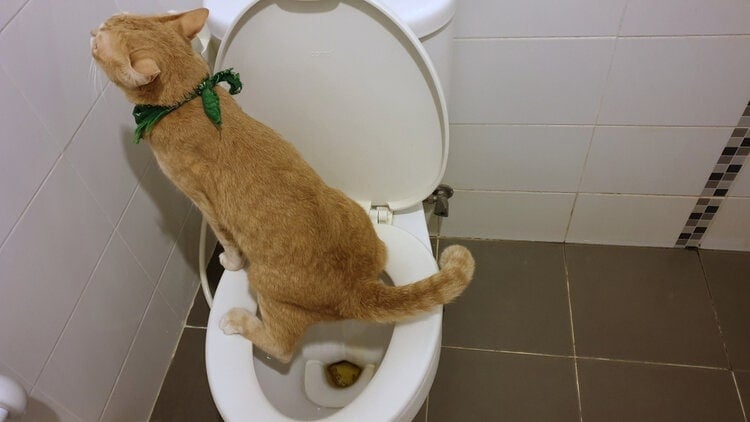Dangers of Flushing Cat Poop in Your Toilet - Precautionary Steps
Dangers of Flushing Cat Poop in Your Toilet - Precautionary Steps
Blog Article
They are making a few great pointers related to Can You Flush Cat Poo or Litter Down the Toilet? overall in this content further down.

Introduction
As feline proprietors, it's important to be mindful of exactly how we take care of our feline close friends' waste. While it may appear convenient to purge cat poop down the bathroom, this method can have detrimental consequences for both the setting and human health.
Alternatives to Flushing
Fortunately, there are much safer and more accountable ways to dispose of feline poop. Take into consideration the complying with options:
1. Scoop and Dispose in Trash
One of the most typical approach of dealing with cat poop is to scoop it right into an eco-friendly bag and throw it in the trash. Make sure to utilize a committed litter scoop and take care of the waste immediately.
2. Use Biodegradable Litter
Select naturally degradable cat trash made from products such as corn or wheat. These trashes are eco-friendly and can be securely dealt with in the garbage.
3. Bury in the Yard
If you have a backyard, think about burying pet cat waste in a marked location far from veggie gardens and water sources. Make certain to dig deep adequate to prevent contamination of groundwater.
4. Mount a Pet Waste Disposal System
Buy a pet garbage disposal system specifically made for feline waste. These systems utilize enzymes to break down the waste, decreasing smell and ecological impact.
Wellness Risks
Along with ecological issues, flushing pet cat waste can likewise position wellness dangers to humans. Pet cat feces might contain Toxoplasma gondii, a bloodsucker that can cause toxoplasmosis-- a possibly extreme ailment, specifically for expecting ladies and individuals with damaged body immune systems.
Environmental Impact
Flushing pet cat poop presents hazardous pathogens and bloodsuckers right into the water system, posturing a considerable danger to aquatic ecosystems. These contaminants can adversely impact marine life and concession water top quality.
Final thought
Responsible animal possession extends beyond giving food and shelter-- it likewise involves appropriate waste management. By avoiding purging feline poop down the commode and choosing alternative disposal methods, we can reduce our ecological footprint and safeguard human health and wellness.
Why You Should Never Flush Cat Poop Down the Toilet
A rose by any other name might smell as sweet, but not all poop is created equal. Toilets, and our sewage systems, are designed for human excrement, not animal waste. It might seem like it couldn’t hurt to toss cat feces into the loo, but it’s not a good idea to flush cat poop in the toilet.
First and foremost, assuming your cat uses a litter box, any waste is going to have litter on it. And even the smallest amount of litter can wreak havoc on plumbing.
Over time, small amounts build up, filling up your septic system. Most litter sold today is clumping; it is made from a type of clay that hardens when it gets wet. Ever tried to scrape old clumps from the bottom of a litter box? You know just how cement-hard it can get!
Now imagine just a small clump of that stuck in your pipes. A simple de-clogger like Drano isn’t going to cut it. And that means it’s going to cost you big time to fix it.
Parasitic Contamination
Believe it or not, your healthy kitty may be harboring a nasty parasite. Only cats excrete Toxoplasma in their feces. Yet it rarely causes serious health issues in the cats that are infected. Most people will be fine too if infected. Only pregnant women and people with compromised immune systems are at risk. (If you’ve ever heard how women who are expecting are excused from litter cleaning duty, Toxoplasma is why.)
But other animals may have a problem if infected with the parasite. And human water treatment systems aren’t designed to handle it. As a result, the systems don’t remove the parasite before discharging wastewater into local waterways. Fish, shellfish, and other marine life — otters in particular — are susceptible to toxoplasma. If exposed, most will end up with brain damage and many will die.
Depending on the species of fish, they may end up on someone’s fish hook and, ultimately on someone’s dinner plate. If that someone has a chronic illness, they’re at risk.
Skip the Toilet Training
We know there are folks out there who like to toilet train their cats. And we give them props, it takes a lot of work. But thanks to the toxoplasma, it’s not a good idea.

I stumbled upon that content on Don’t flush cat feces down the toilet while doing a search on the search engines. Those who enjoyed reading our blog entry if you please be sure to share it. Many thanks for your time. Please check our website back soon.
Schedule Today! Report this page